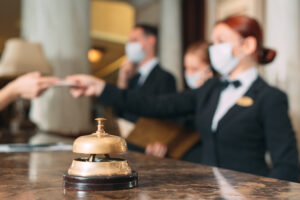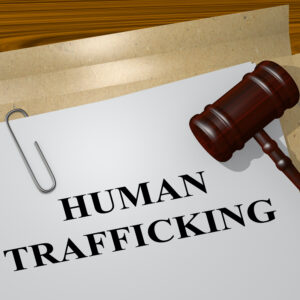What are Hotels Doing to Combat Human Trafficking?

Between 28 and 40 million people are victims of human trafficking worldwide, unfortunately the use of hotels and motels have become common practice for sex traffickers. Hotels and motels are also used to house trafficked workers who are forced into labor. According to Polaris, a nonprofit that specializes in human trafficking, in 2020, 10,583 situations of human trafficking were reported to the U.S. National Human Trafficking Hotline involving 16,658 individual victims. And between 2007 and 2017, 3,596 cases of human trafficking involving hotels or motels have been reported to the National Human Trafficking hotline.
Human Trafficking Awareness and Prevention Training
The U.S. Department of State estimates that 25 million people were trafficked across the globe in 2021. And many perpetrators use hotels and motels while trafficking their victims, therefore hotels have taken steps to combat human trafficking by training employees to identify indicators of human trafficking.
Business Ending Slavery and Trafficking (BEST) is a non-profit that specializes in educating employers in human trafficking awareness and prevention. BEST Inhospitable to Human Trafficking Training is sponsored by AAHOA, the Asian American Hotel Owners Association whose members own 60% of the hotels in the U.S. AAHOA aims to train its members and their employees in human trafficking prevention and awareness. The training helps hotel employees to identify and safely report signs of suspected human trafficking.
The increased usage of contactless technology such as mobile check-in and mobile key reduces the interaction between hotel employees and guests and makes it more difficult for employees to recognize human trafficking. The BEST training addresses the adoption of contactless technology, such as text messaging and apps required for check-in and aims to help hotels use these technologies to help in the prevention of human trafficking, despite the decreased interaction with guests. The training also addresses unconscious bias and behavioral indicators of human trafficking in order to help identify suspected trafficking situations in hotels.
The BEST Inhospitable to Human Trafficking Training has been certified by the Florida Division of Hotels and Restaurants as an approved human trafficking awareness training and meets the requirements of the new Florida human trafficking mandate. AAHOA has trained close to 7,000 people to recognize indicators of human trafficking through the BEST Training.
Human Trafficking Awareness Training Legislation
69% of perpetrators of human trafficking use hotels while trafficking victims and 75% of survivors came in contact with a hotel while being trafficked. As a response, states have been passing legislation that require hotels to train employees to recognize suspected victims of human trafficking.
As of October 1, 2022, all innkeepers in Maryland are now required to provide human trafficking prevention training to their employees. All hotel operators are required to provide employees with annual human trafficking prevention training within the first 90 days of their employment and training must be certified and approved as meeting the requirements specified by the state.
New York has recently signed legislation that is expected to become effective in 2023 and requires every inn, hotel, motel, motor court to include training in the recognition of human trafficking victims. The new legislation also requires information about human trafficking and ways to help victims to be displayed as information cards and signs in places like hotels and transportation hubs. Lodging facilities are required to provide human trafficking training to employees within the first 60 days of their employment.
Similar to New York, Virginia has also passed legislation that is expected to become effective in 2023 and will require the training of hotel operators and their employees to recognize and report instances of suspected human trafficking. The new law will require mandatory training to be provided at no cost and will require employees to undergo human trafficking training within 6 months of their employment.
9 other states have also passed laws that require human trafficking prevention and awareness training for employees within the lodging industry. States like California, Connecticut, Florida, Illinois, Iowa, Minnesota, New Jersey, North Dakota and Texas have all passed legislation requiring human trafficking training for hotel operators and their employees.
Key Factors in Human Trafficking Awareness and Prevention
Train Staff on What to Look for and How to Respond
According to organizations that specialize in human trafficking, training is crucial in order to have staff be prepared to handle the issue of human trafficking. Hotels should adopt a policy of training employees during the hiring process, as well as conducting mandatory annual trainings for employees at all levels. It is recommended that whenever possible, training should be conducted by human trafficking survivors. Survivors have a wealth of knowledge regarding the world of human trafficking and can be an asset to hotel employees. Hotel owners and associations should adopt a policy that requires all members to have a human trafficking policy in place.
Post the National Human Trafficking Hotline for Victims to Access
According to many organizations, victims of human trafficking are often kept in isolation and giving them access to lifesaving information can be difficult. It’s important to place information about human trafficking in areas that victims will have access to. Contact information to the National Human Trafficking Hotline can be posted on idle television screens, in concierge binders, inside nightstands, on soap or lotion bottles and on hotel vending machines.
Hotel Panic Buttons Can Help in Human Trafficking Prevention
Human trafficking is a $150 billion global industry annually, with $99 billion per year being made from sex trafficking. Numerous states have passed laws requiring that hotel operators provide their employees with human trafficking awareness training and hotels can include the use of panic buttons in their human trafficking policies. Trained employees are better able to identify indicators of human trafficking and panic buttons can be used by employees to send out silent emergency alerts to hotel personnel in order to provide victims with crucial assistance.
Many cities and states have passed hotel panic button laws and major hotel brands have also committed to providing staff with panic buttons as a part of the AHLA’s 5-Star promise. Panic buttons are safety devices that are carried by employees and can be activated when they encounter threatening situations and require assistance. Panic buttons send emergency alerts to hotel security personnel and provides the precise location of the employee in distress.


